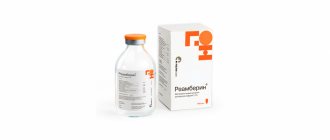Monural for cystitis is a medicine quite often prescribed by doctors.
There is nothing surprising in this, given the effectiveness and relative safety of the drug.
Doctors note that the drug has proven itself to be effective, not only as a single medication, but also as part of complex therapy.
The main thing is to know the indications for its use and remember the rules of use.
What is the use of Monural for cystitis, patients are interested in, and how to choose the correct dosage of the drug.
Can the medicine be used to treat children and the elderly, and is it an antibiotic?
What is cystitis
Before you learn how to use Monural cystitis powder, you need to understand what kind of disease it is – cystitis.
After all, if you don’t know the specifics of its development and which organ it affects, you won’t be able to understand the effect of the drug.
Cystitis in medical practice refers to inflammatory processes affecting the inner mucous membrane of the bladder.
The inflammatory process can be either aseptic, that is, without the participation of pathogenic microflora, or with the participation of pathogenic microorganisms.
Since the bladder is not sterile, cystitis is mainly a consequence of the uncontrolled proliferation of various pathogenic or opportunistic microorganisms.
The disease is accompanied by quite striking symptoms.
The patient may complain of pain in the abdomen, and more specifically, in the area of the projection of the bladder.
Often there are problems with urination of various types, and there is an admixture of pus in the urine.
Mostly the fairer sex, as well as young children, suffer from cystitis.
In men, inflammation in the bladder is rare, which is explained by the structure of the genitourinary system.
However, representatives of the stronger sex are also not immune from the disease.
Especially if there is a genitourinary tract infection in his body for a long time.
Monural
Monural is an original Swiss broad-spectrum antibiotic based on the substance fosfomycin trometamol. The drug has a bactericidal effect associated with the suppression of the initial stage of cell wall synthesis of microorganisms sensitive to it. Another useful property of monural is anti-adhesive: it does not allow bacteria to stick to the epithelium of the genitourinary tract, thereby interfering with their bloodthirsty plans to seize new territories. The drug prevents most gram-positive bacteria from existing peacefully in the human body, including representatives of pathogenic and opportunistic microflora such as Staphylococcus aureus, Staphylococcus saprophyticus, Enterococcus spp., Enterococcus faecalis. Monural does not remain indifferent to gram-negative microorganisms: Klebsiella pneumoniae, Morganella morganii, Escherichia coli, Citrobacter spp., Klebsiella spp., Proteus mirabilis, Enterobacter spp., Pseudomonas spp., Serratia spp. Monural is used mainly for urinary tract infections: cystitis, urethritis in various variations and clinical and therapeutic circumstances.
Monural, unlike domestic fosfomycin, is produced not in parenteral, but in oral form, or more precisely, in granules for preparing a solution for oral administration.
Before taking Monural, the bladder and digestive tract should, if possible, be empty. The frequency of taking the drug is 1 time per day, the recommended dose is 1 three-gram packet two hours before or after a meal, optimally before going to bed. Children over 5 years old take 2 g of the drug per day. As part of antibacterial therapy, only one dose of monural is provided, that is, the course of treatment is only 1 day. In more severe cases (persistent infections with a tendency to recur or the patient’s advanced age), it is allowed to take another package of monural a day after taking the first one. In order to prevent infection in the urinary tract during transurethral diagnostic procedures or surgery, take 1 packet of the drug 3 hours before the intervention and another 1 packet 1 day after the first dose. If the patient has a history of renal failure, the dose should be adequately reduced and/or the time interval between doses of the drug should be increased.
Properties of Monural and the active ingredient of the drug
Often patients faced with the disease wonder how Monural works for cystitis, which ensures its effectiveness.
Everything is very simple.
The main active ingredient of the drug is fosfomycin.
The substance has strong antibacterial activity, essentially belonging to the class of antibiotics.
The action of fosfomycin is quite transparent.
The substance blocks a number of transformations in the body.
Because of this, bacterial cells are unable to properly absorb nutrients.
The drug also interferes with the normal synthesis of cell membranes of microbial cells.
As a result, their natural death occurs.
The effectiveness of the drug with fosfomycin has been proven against Klebsiella, Haemophilus influenzae, staphylococci and enterococci.
Also a number of other pathological and opportunistic microorganisms.
It also happens that Monural does not help with cystitis.
A natural question arises as to why this happened.
The fact is that, like any antibiotic, the medicine can only act on certain microorganisms.
If the inflammatory process is triggered by a bacterium that is resistant to fosfomycin, then the therapy will have no effect.
The situation will be similar if the disease is caused by a virus or fungus.
pharmachologic effect
Monural is a good antibiotic with broad therapeutic activity. It is considered a phosphonic acid derivative and is structurally similar to pyruvate phosphoenol. It has excellent bactericidal properties and prevents the further development of pathogenic microorganisms. Effective against gram-negative and gram-positive bacteria. In particular, it helps fight streptococci, staphylococci, Proteus, Klebsiella, enterobacteria and other pathogenic pathogens.
After ingestion, it is instantly absorbed into the digestive organs and bloodstream. The highest concentration of the drug is observed after 2-2.5 hours.
Excretion occurs in most cases by the kidneys and a small part is metabolized in bile.
Indications for the use of Monural
Many patients are concerned about the indications for using the medication.
First of all, of course, the remedy is prescribed if the patient suffers from symptoms of cystitis.
Moreover, as doctors note, the drug performed best in acute infectious processes of bacterial origin.
Monural for chronic cystitis, on the contrary, has not proven itself as an effective remedy.
Therefore, it is practically not used in practice if the inflammation has become permanent.
However, as doctors note, the matter is not limited to inflammatory processes in the bladder.
The medicine may be additionally prescribed in the following cases:
- the urinary tract is involved in an acute infectious process
- urethritis (inflammatory reaction in the urethral tract) has developed in an acute form
- the patient suffers from urethral syndrome, which is accompanied by problems with urination, which reduces the patient’s quality of life
- infectious complications have developed in the genitourinary system after surgical intervention in the body
The drug is also often recommended for use if surgery is planned on the genital area.
Or any invasive research that poses a risk of infection.
In this case, the prescription plays a preventive role.
The doctor works proactively, trying to prevent the development of pathology.
Indications
The main indications for taking the drug are:
- Cystitis due to an acute bacterial infection.
- Nonspecific urethritis of bacterial nature.
- Acute course of bacterial cystitis in the acute stage.
- Extensive bacteriuria in women during pregnancy, occurring without symptoms.
- Infections of the urinary tract in the period after surgical interventions.
- Prevention of infectious diseases of the urinary tract due to operations and diagnostic procedures.
Monural dosage regimen for cystitis and other pathologies
Instructions for using Monural for cystitis are quite simple.
If the infection was caught at an early stage of development, before it progresses, you can drink one sachet of the drug only once.
This is enough to stop the proliferation of pathogenic microorganisms and achieve a cure.
However, in some cases, a single use of the product is not enough.
If a relapse occurs, the medication is taken according to a strictly defined regimen, following the instructions.
For example:
- for recurrent pathology, you should drink 1 sachet once a day for 2 days (the recommended interval between uses is 24 hours, which allows you to achieve optimal concentration of the drug in the blood)
- during planned surgical or invasive diagnostic intervention, the first sachet is drunk before the procedure 2.5-3 hours, and the second 24 hours after the intervention
The optimal time to take is evening.
It is best if the powder is drunk on an empty stomach, a few hours after dinner.
The contents of the sachet are dissolved in cold water and then quickly drunk in one gulp.
It is important to remember that the drug is not prepared in advance.
It is necessary to prepare a new remedy each time for each subsequent appointment.
Otherwise, there is a chance that the solution will not work or cause more adverse reactions than it should.
Composition and release form
The drug is dispensed in the form of homogeneous granules for further preparation of parenteral solution. White powder with a pleasant fruity aroma. Packaged in multi-layer bags and a secondary paper pack with attached instructions for use. One package contains 1-2 packets of various volumes of product:
- Laminated sachets containing 3.7 g trometamol fosfomycin and 2 g fosfomycin.
- Laminated packets containing 5.6 g of fosfomycin trometamol and 3 g of fosfomycin alone.
The active ingredients of the drug are fosfomycin trometamol and fosfomycin in its pure form.
Additional components: sucrose, orange and tangerine flavors, saccharin.
The drug is dispensed only with a doctor's prescription.
Recommendations for using Monural for children
Monural for children with cystitis is prescribed in pediatric practice.
Moreover, the drug is used quite often, since children are at risk for developing bladder infections.
True, there is a limitation: if the child is less than 5 full years old, it is not prescribed.
Since its effect on such crumbs has not been fully studied.
A separate type of product is available for children.
In addition to the main active ingredient, sucrose and flavorings are added to the composition to make it easier for the child to use the medication.
Thanks to its pleasant taste, it’s not difficult to get your baby to drink the powder.
The pattern of use in children is not much different from that in adult patients.
For example, in case of an acute infectious process, 1 sachet is recommended for 1 day.
The course is 24 hours.
Naturally, the doctor can adjust the treatment regimen at his own discretion if he considers it necessary.
In most cases, parents who treated their children with Monural were satisfied with the effectiveness.
By following medical recommendations, it was possible to achieve a cure for the disease and eliminate symptoms.
Relapses with proper therapy are the exception rather than the usual, which is also a positive thing.
Monural: instructions for use
According to the instructions, the drug is intended for oral administration. The granules are diluted in 60-70 ml of water at room temperature. Take the antibiotic before meals 2 hours or after. It is better to drink before going to bed, having gone to the toilet beforehand.
The dosage and duration of the course of therapy directly depends on the form of the pathology and the age of the patient.
Adult patients are prescribed a one-time dose of 3 g. In severe cases of the disease, the dose can be doubled. The patient is then given 3 g again after 24 hours.
To prevent infectious processes of the urinary tract due to operations, it is recommended to use the medicine 3 hours before surgery, and a day after it in the amount of 3 g.
In children over 5 years of age, the drug is prescribed once a day, 2 g.
In case of disorders of the excretory system, the therapeutic dose must be adjusted.
Contraindications to the use of Monural
Monural and analogues for cystitis, despite frequent use, should be used with great caution.
The drugs, like any other antibacterial agents, have a number of serious contraindications.
First of all, you will have to stop using this group of drugs if you have problems with your kidneys.
Kidney function is assessed using an indicator called creatinine clearance.
And if this indicator drops below 10 ml/min., the products are strictly prohibited.
This is due to the fact that medications will only worsen the already poor condition of the renal system in this case.
Such medications are always prescribed with caution for various liver pathologies.
Despite the fact that most of it is excreted by the kidneys, some still undergo metabolization in this organ, which is primarily used to neutralize toxic substances.
In case of liver pathologies, use is carried out with caution, as there is a possibility of aggravating liver disease.
Another serious contraindication that should always be taken into account.
This is the presence of individual intolerance to either the main component or additional substances included in the powder.
For patients who develop signs of intolerance after the first use, the drug regimen is reviewed.
It is strictly forbidden to remain silent about intolerance if it has developed.
You should tell your doctor about it, and immediately!
Possible side effects of Monural
If a doctor prescribes a medication, he usually takes into account the likelihood that side effects of Monural may develop.
It is usually practically impossible to predict their formation with 100% probability.
However, it is always necessary to remember that there is a risk of their development.
If you do not take it into account, there is a high probability of encountering serious problems in the future.
Among the side effects, doctors call:
- attacks of nausea and vomiting
- heartburn
- stool disorders such as diarrhea
- abdominal pain
- the appearance of red rashes on the skin
- Patient complaints of itching, burning of the skin
- other options for allergic reactions and intolerances
If one or more side effects develop after using the medicine, be sure to report this to your doctor.
The doctor decides whether to stop the medication and whether it will do more harm than good.
Often, if adverse reactions do not greatly affect the patient’s life, Monural is not removed from the treatment regimen.
Since the expected benefit is higher than the expected harm in the long term.
However, if side effects greatly affect the quality of life, this is a reason to discontinue the medicine and remember that the patient has an intolerance.
Monural for cystitis in men
Treatment of representatives of the stronger sex can also be used in clinical practice.
At the same time, medicine is rarely used directly for inflammatory processes in the bladder, since cystitis practically does not occur among men.
After all, their urethra is too long for infection to easily get from it to the bladder area.
However, you should not exclude such a development of events, as well as refuse to use the medication for symptoms of urethritis.
Monural is used in the same way as in the case of women.
Most representatives of the stronger sex need to drink one sachet of medication to cope with the disease.
This is due to the strength of the active substance.
In exceptional cases, double dosage may be required.
Then the dose is repeated at intervals of 1 full day to achieve recovery.
In representatives of the stronger sex, especially when it comes to an uncomplicated course of the process, the therapy is well tolerated.
Caution should be exercised when prescribing this medication to older men.
Since during this period the performance of the kidneys and liver may be reduced, which will delay the active substance of the medication in the body.
What tests are used to prescribe Monural?
Patients often ask questions about what tests are needed before Monural.
To make sure that the drug will work fully and will be effective in combating inflammatory processes.
The question is quite logical, since in modern medicine it is practically not practiced to prescribe medications without first undergoing a series of tests.
First, you should make sure that the inflammatory process in the bladder is caused by bacteria.
To do this, a urine test is performed, which evaluates the activity of bacterial cells, the presence of blood or pus in the urine, which also indicates pathology.
Urine can be sown on nutrient media to understand which microflora predominates.
Secondly, a culture test for sensitivity to antibiotics is required.
Only after it should Monural be prescribed if the identified bacteria are sensitive to the main active substance.
If there is no sensitivity to the drug, prescribing treatment with Monural is simply impractical.
Only the attending physician can decide what to do if Monural does not help with cystitis!
Which doctor can recommend Monural
Another pressing question among patients is: which doctor to contact for an appointment.
You shouldn't be surprised by this interest.
After all, patients are often embarrassed about their problem when it comes to diseases of the genitourinary system.
They don't even try to find out which doctor can help with certain symptoms.
First of all, of course, Monural is a urological drug.
It is urologists who deal with diseases of the urinary system in both men and women.
Therefore, they often resort to prescribing this drug.
In addition to the urologist, a gynecologist can also prescribe a woman, although this happens quite rarely.
This purpose is explained by the fact that the genitourinary system in women is closely connected.
A gynecologist is often a specialist not only in the organs of the reproductive system, but also in the urinary organs.
If we are talking about a small child, the medicine can be prescribed to him by the attending pediatrician.
Also, the baby can be examined by a specialized doctor, and then the prescription of therapy will be received from him.
In rare cases, Monural is recommended by doctors of other specialties, including dermatovenerologists.
special instructions
It is recommended to avoid simultaneous intake of food and the drug during the course of therapy. Because food interferes with the normal absorption of the latter. Therefore, you need to drink the solution 2 hours before or after meals.
Particular caution should be exercised when prescribing a pharmacological agent to patients with diabetes mellitus. Because one pack of the drug contains sucrose.
It is not recommended to use the antibiotic for persons suffering from severe forms of kidney failure. In milder conditions, administration is possible, but a mandatory adjustment of the therapeutic dose is required.
Women during pregnancy and breastfeeding are prescribed a drug in extreme cases, if the benefit to the health of the mother greatly outweighs the threat to the fetus.
Features of using Monural during pregnancy
Pregnancy is a special period in the life of every woman.
What is meant here is not only the joy and happiness of expecting a new addition to the family, but also natural health problems that a rare pregnant woman can happily avoid.
So, for example, cystitis in pregnant women is aggravated much more often than in ordinary women on average.
This is due to the fact that the enlarged uterus prevents the normal outflow of urine from the bladder.
This contributes to the reverse flow of urine, causing an exacerbation of infectious processes.
Naturally, it is necessary to treat cystitis if it makes itself known during pregnancy.
Monural is approved for use during pregnancy and cystitis.
Although the main active ingredient penetrates the placenta, in a number of studies doctors have proven that its effect on the child is so insignificant that it can be neglected.
Naturally, one of the main conditions is the woman’s lack of individual intolerance to the medication.
If there is intolerance, you will have to abandon Monural and look for alternative medications.








